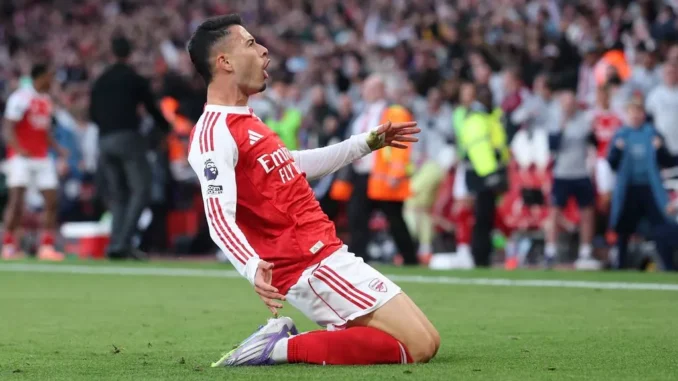
Gabriel Martinelli’s late strike rescued Arsenal from what looked like a crushing defeat to Manchester City, the Brazilian’s stoppage-time lob sealing a dramatic 1-1 draw at the Emirates. For much of the game it appeared City would leave North London with a textbook smash-and-grab win, but Arsenal’s persistence and Martinelli’s composure rewrote the script in the dying moments.
City took the lead early when a rapid counterattack ended with Erling Haaland finishing clinically inside the opening ten minutes. Pep Guardiola’s side, uncharacteristically, then retreated into a disciplined defensive shape, allowing Arsenal possession but offering little space to break them down. It was a pragmatic strategy that almost secured the three points, with City recording one of their lowest-ever possession figures under Guardiola.
Arsenal’s struggles in the first half forced Mikel Arteta into action at the break. The introductions of Eberechi Eze and Bukayo Saka injected urgency and attacking variety. Eze in particular played a pivotal role, later producing the lofted ball that Martinelli latched onto for the equalizer. The Brazilian timed his run perfectly and calmly lifted the ball over Gianluigi Donnarumma in stoppage time, sparking wild celebrations around the Emirates.
After the match, Arteta expressed pride in his players’ resilience but admitted frustration at not turning dominance into victory. “I’m extremely proud of the players and the team,” he said. “But that doesn’t make me happy — the thing I wanted today was to win the game.” His comments highlighted the balance between satisfaction at salvaging a point and the frustration of missed opportunities.
Declan Rice was quick to hail Martinelli’s contribution, describing the goal as “a moment of magic.” He emphasized the mentality shown by the forward, noting that impact substitutes can change the course of games with heart and determination. Martinelli’s ability to deliver off the bench has become a defining quality of his role, underlining his importance in a squad competing at the top level.
For Guardiola, the draw showcased City’s capacity to adapt when required. “Our resilience was fantastic, otherwise we can’t survive,” he reflected, pointing to the need for pragmatism in matches of such magnitude. Though unorthodox by City’s usual standards, the defensive approach almost delivered a statement win against a direct rival.
The match also provided several talking points beyond the scoreline. Arsenal’s bench proved decisive, raising questions over selection decisions and whether players like Martinelli and Eze might warrant earlier involvement. City’s tactical shift to a deeper, more conservative setup revealed a willingness to sacrifice possession for solidity — a move that will fuel debates about their evolving style. And for the broader title race, the result reinforced the razor-thin margins that separate triumph from frustration.
Ultimately, the night belonged to Martinelli. His intervention not only salvaged a point but also sent a message about Arsenal’s refusal to be beaten easily. For Arsenal, the result was both a relief and a reminder of the fine lines in their pursuit of the title. For City, it was proof that even when adopting an unfamiliar game plan, they remain capable of grinding out results against elite opposition.
As the dust settles, one truth stands out: in matches of this magnitude, the story can change in a single heartbeat. Martinelli’s lob ensured Arsenal’s title hopes stayed intact — and reminded everyone that football’s greatest drama often comes at the very last moment.
Leave a Reply